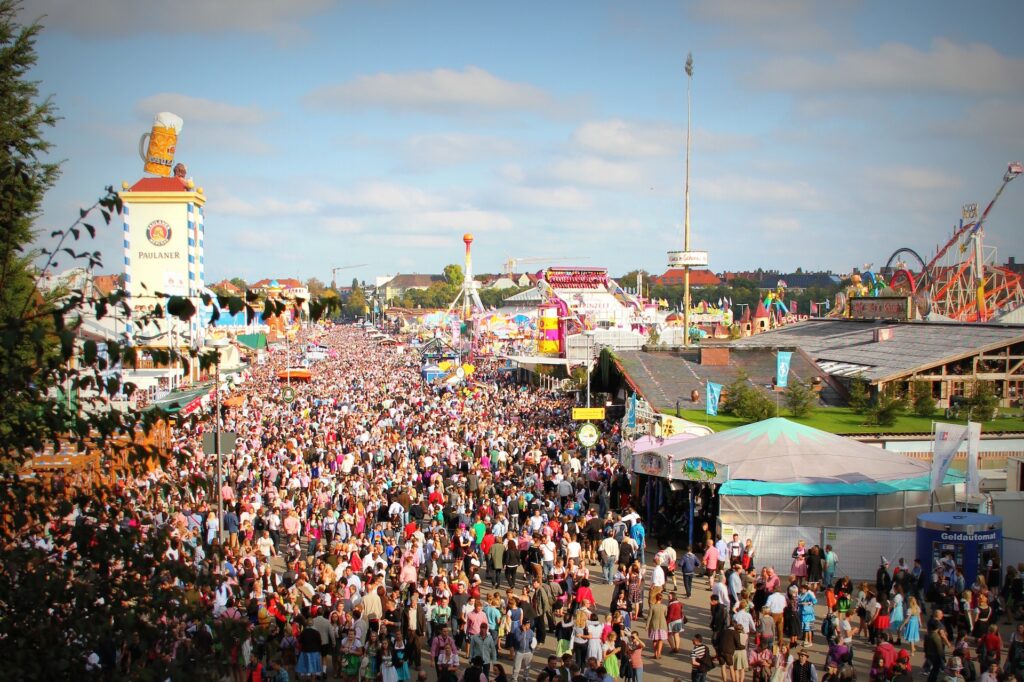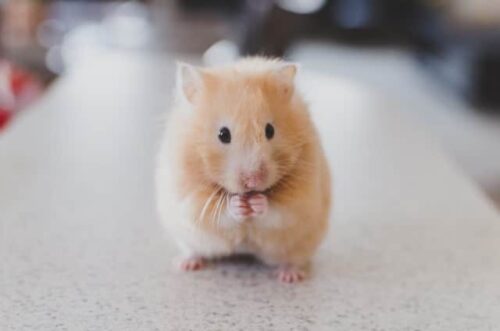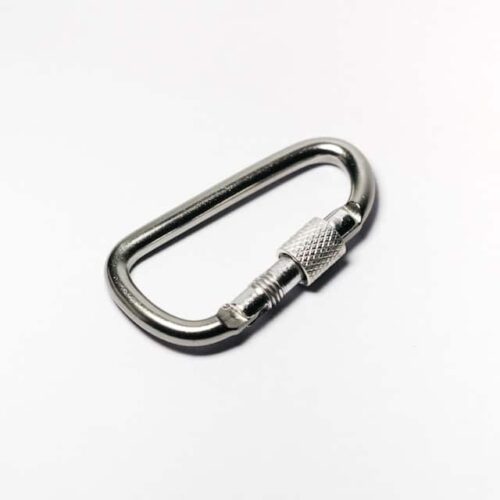
89 German Words Used in English
Did you know there are so many English words derived from German?
They’re fun to say, they pop up in various cultural references (like movies, TV shows and songs) and they can even assist you with gaining fluency in German.
Keep reading to learn about 89 of the more intriguing and cool Germans words that are commonly-used in English.
Contents
Download: This blog post is available as a convenient and portable PDF that you can take anywhere. Click here to get a copy. (Download)
Daily Life
1. Autobahn
Referring to the famous highway in Germany where drivers abide by no speed limits, the word Autobahn has transferred to the English language to mean a mere expressway. Many tourist attractions use this name, such as the Autobahn Indoor Speedway in Alabama.
2. Automat
This one is fairly simple, since it refers to a machine that takes money and serves food or drink, typically at fast food restaurants. It’s not that common of a word anymore, but we still see vending machines, which are a form of automat.
3. Diesel
Diesel fuel is named after Rudolf Diesel, the inventor of the diesel engine.
4. Gesundheit
This word’s literal meaning is “health” in German, but it can be used after a sneeze to mean “bless you.” People of all languages use it around the world.
5. Kaput
“This car is kaput!” If you say that in English, it means that the car is not working or broken. The word has the same meaning in German.
6. Kindergarten
This is the grade before first grade. In German the word literally means “child garden.”
7. Uber or über
It can be a preposition or a prefix in German, and it generally means something like “above,” “higher” or “greater.” In English we tend to use it similarly, possibly calling people things like an “uber-chef,” an “uber-planner” or an “uber-[expletive].”
8. Fest
If you plan on going to a party or celebration, you can tell everyone that the word “fest” came from Germany, like when it’s used for the feasts of Oktoberfest and Maifest.
War
9. Anschluss
Although this word means connection, it comes from the forced integration of Austria with Nazi Germany.
10. Achtung
The word achtung means “attention,” yet we’ve seen it in several cultural references such as the U2 album “Achtung Baby.”
11. Blitzkrieg
Meaning “lightning war,” this is used to describe the tactics used by Germany to quickly conquer many different European countries at the start of World War II. The word was then later appropriated by the Ramones and used in their song “Blitzkrieg Bop” to conquer the hearts and minds of punk rock fans.
12. Blitz
The term “blitz” was derived from “Blitzkrieg” and translates as a sudden military attack. It was first used by the British press during the bombing campaign against the UK in 1940 to 1941 during the World War II.
A more common use of the word in English would be a blitz by the defense on an American football quarterback.
13. Fuhrer or führer
This means “leader” or “driver” in German, and was used to refer to the big H. Even today, mentioning the words “Hitler” or Führer in Germany can get the attention of a room full of people—but note that it won’t be the good type of attention, and they probably won’t be impressed with your command of these two German words.
14. Gestapo
This is an interesting word, because although it simply means a police force in German, Gestapo has a negative connotation throughout the rest of the world, because of how the World War II Gestapo lead the way to a mass genocide.
15. Kaiser
This refers to a German or Austrian emperor (the word that in turn came long ago from the Latin word Caesar), and in English it’s mainly used in contexts that refer to the time before and during World War I. By the time that war ended in 1918, Kaiser Wilhelm II had been exiled to the Netherlands.
16. Nazi
The word Nazi once denoted a person or idea associated with the National Socialist political party, but now it’s associated with tyranny and Hitler. Therefore, when someone calls another person a Nazi, it simply means they are a fanatical person.
17. Panzer
Panzer technically means “armor” in German, but it’s become synonymous with the light German military tank.
18. Reich
In German, this word has use for the term “empire” or as part of the name of a nationalized service, like the post office. However, since the Third Reich, the word has deep connections with the tyranny of Hitler’s reign. This tyranny is the primary meaning in the English-speaking world.
Food & Drink
19. Bagel
Many English speaking people use this word every morning, and this tasty bread food actually comes from Poland, but Germans also called them bagels or beigels.
20. Biergarten
This is also often written as “beer garden,” which makes it more English-y and which gives away its meaning in German. In English, it can be used to describe almost any place that serves beer, especially German beer.
21. Bratwurst
As one of the most popular sausages in Germany, English-speaking folks enjoy grilling and talking about these as well. (Editor’s note: Shout-out to Madison, Wisconsin—home of the World’s Largest Brat Fest!)
22. Bretzel
A rather popular sandwich shop in the US is called Hannah’s Bretzel, and the word is referring to a pretzel. It can either be a hard or soft pretzel.
23. Delicatessen
You may know this as the word “deli,” yet you’ll still find many shops that have the word “delicatessen” plastered on the sign. It refers to a place that sells delicacies like cheeses and meats. Delicatessen includes two separate German words: delikat means “delicious” and essen means “to eat.”
24. Frankfurter
It is a smoked sausage and “frankfurter” refers to the respective city of origin — Frankfurt.
25. Einkorn
Einkorn is an ancient type of wheat, and it was grown in Germany, but many farmers around the world are trying to bring it back.
26. Knockwurst
Wurst is the German word for “sausage,” so any time you see it, you’re likely to get meat in tube form. Knockwurst (also written as “knackwurst” in English—the German version is also written with the “a”) probably comes from knacken, which is the popping or cracking sound that the sausage makes when bitten into.
27. Hamburger
While the origin of the food called a hamburger may be in doubt, the word itself clearly refers to a person or object originating from the city of Hamburg. How this food then became a staple of stereotypical “American food,” an idea that even many Germans believe, remains a subject for a different post.
28. Kraut
Kraut, as used in both English and German, is a type of cabbage.
29. Kohlrabi
Similar to kraut, kohlrabi is also a type of cabbage.
30. Kuchen
Kuchen is the actual word used for cake in German, but in English-speaking countries it could refer to a wide variety of desserts and pastries.
31. Lager
The word lagern is a verb that means “to store” or “to wait,” and in fact that’s what happens with lager beer: It’s stored for a period of up to six months to age before consuming.
32. Liverwurst
The Germans call it Leberwurst, from the German words Leber (liver) and Wurst (sausage), but English-speaking people know this tasty sausage and spread as liverwurst.
33. Noodle
From the German word Nudel, this is a popular pasta food we all know and love.
34. Nosh
If you were to say, “I’m filling the cooler with some nosh,” you’d be talking about food.
35. Pumpernickel
Pumpernickel is a dark, compressed bread, sold all over the world.
36. Sauerkraut
Sauerkraut means “sour cabbage” in German.
37. Sauerbraten
Although it’s still technically a completely German word, many English-speaking people use it to refer to a German pot roast.
38. Schnapps
Anyone who drinks has probably heard of Schnapps at some point. The distilled beverage is written schnaps in German.
39. Schnitzel
A schnitzel is basically a meat cutlet and a Wiener Schnitzel is a schnitzel from Vienna (Wien). They’re usually served with lemon and maybe a side of potatoes, but not sauerkraut.
40. Seltzer
The word seltzer means a type of soda or carbonated water.
41. Sparerib
A sparerib, often used as two words, is a pork or beef rib.
42. Spritz
You may think this is slang, but it’s actually a real English and German word. Do you want a spritz of water on this hot day? It means a small bit of liquid.
43. Strudel
The German word Strudel is used to describe the delicious pastry dessert, but it also can mean a sort of whirlpool effect in rivers.
44. Wiener
It’s a thin sausage from Vienna, the capital of Austria.
To hear how these words are used by native German speakers today—since the meaning is sometimes different in German compared to how they’re used in English!—you can get more context with the videos on FluentU.
FluentU takes authentic videos—like music videos, movie trailers, news and inspiring talks—and turns them into personalized language learning lessons.
You can try FluentU for free for 2 weeks. Check out the website or download the iOS app or Android app.
P.S. Click here to take advantage of our current sale! (Expires at the end of this month.)
Science
45. Cobalt
Cobalt is both an element and a color, and it’s found in the earth’s crust and on the periodic table at number 27.
46. Ansatz
An ansatz is similar to a hypothesis, in that it is used in math and science in reference to making an educated guess that will later be tested and verified. In German it has a more literal meaning about the initial placement of a tool for work purposes.
47. Gestalt
Gestalt is a theory of the mind, which is thought to have originated in Berlin. It refers to something that is more than the sum of its parts.
48. Götterdämmerung
The rather fun götterdämmerung word is used to talk about a catastrophic event in English, but in German mythology it marks the downfall of the gods. This comes from the two German words Götter (gods) and Dämmerung, which refers to the twilight at dusk.
49. Gedankenexperiment
The German word Gedankenexperiment is composed of two different parts: Gedanken meaning “thought” and experiment which is an exact equivalent to the English word “experiment.”
Together, we get the meaning “thought experiment” from gedankenexperiment. This word was popularized by Albert Einstein in both English and German to refer to the use of complex mental reasoning instead of actual physical evidence as proof of his theories in physics.
50. Feldspar
The Germans called this Feldspat, but in the English-speaking world it’s called “feldspar,” and it’s a type of rock that forms 60% of the world’s crust.
51. Pitchblende
This is merely a form of the mineral uraninite.
Animals
52. Dachshund
As you may know, the word Hund in German means dog. Pair that with Dachs and you get a badger dog, which simply means a breed of dog with a long body and short legs in English.
53. Hamster
A hamster is the furry little creature many people keep as pets, but the word is considered to come from Germany.
54. Schnauzer
This breed of dog comes straight from Germany, and the breed name typically means mustache or snout.
Outdoors and Sports
55. Abseil
The word abseil is commonly used by rock climbers when they talk about descending by rope. Although you would generally say that you are abseiling, another less German way to refer to this action is by saying you’re rappelling.
56. Carabiner
The German word karabinerhaken is a spring hook safety system used on German rifles. In English-speaking countries the word “carabiner” derived from that, but it’s mainly talking about a metal safety loop employed by rock climbers.
57. Cringle
A cringle is an area of a boat in which you would pass a rope.
58. Gelandesprung
For those skiing fans out there, this word is referring to a ski jump, generally over an obstacle. You can even see it posted on the sign of the Gelandesprung Ski Club in Green Bay, Wisconsin.
59. Hinterland
A word that means “backwoods,” or “the land behind,” hinterland mainly refers to wilderness areas in both the German and English languages.
60. Knapsack
One might call this a backpack or book bag.
61. Langlauf
Langlauf usually means some sort of cross country skiing, but others use it for cross country running as well.
62. Rucksack
Hikers generally use this word in English to mean a backpack. In fact, the most common use of the word is in the military. The literal German translation is “back sack,” but it’s still referring to the same item, a backpack.
Other
63. Kitsch
Something kitsch is of low taste or quality, often used when talking about art or design. No, it doesn’t have anything to do with actor Taylor Kitsch.
64. Ersatz
Ersatz is what some might call a knockoff, in that it’s a product that is created as an inferior substitute.
65. Angst
The word angst implies a feeling of anxiety or depression in the English language.
66. Bildungsroman
Both in German and English, a Bildungsroman is a genre of novel that shows the moral and psychological development of a character from childhood to adulthood. This is word is a combination of two German nouns: Bildung meaning “education” and roman meaning “novel.”
67. Doppelgänger
“Doppelgänger” has gained much traction in pop culture (used quite a bit in “How I Met Your Mother”), and it means when you see someone who looks exactly like someone you know. It’s often used in literature and refers to a supernatural phenomenon where the person looks like they have been duplicated.
68. Wagnerian
If someone calls you a Wagnerian, you are a follower of composer Richard Wagner.
69. Waltz
The waltz is a formal dance in both German and English.
70. Zeitgeist
When someone talks about a zeitgeist in English, it pertains to a worldview or overall mentality of a large group of people. In German it means “time ghost.”
71. Zeppelin
A Zeppelin is a type of large airship named after its inventor, and English people use it the same way as Germans. Led Zeppelin is a nice cultural reference to the word. Legend has it that a friend of Jimmy Page said the band would either take off, or fall like a lead Zeppelin. Page took out the “a” in “lead” to complete his band name.
72. Edelweiss
Made popular by the “The Sound of Music” song by the same name, Edelweiss is a beautiful white flower that is seen quite a bit during the Christmas season.
In fact, this word is another combination of edel meaning “elegant” and weiß which is the color “white.”
77. Echt
There’s not much to this one. “Echt” means typical or authentic.
73. Eiderdown
This refers to the small, soft feathers of a duck, often used for blankets or comforters.
74. Flak
Has anyone ever told you, “Stop giving me flak”? The actual German definition for this is an air defense cannon, but English folks say it when talking about criticism.
75. Fife
A fife is a small, high-pitched flute.
76. Graupel
You may hear a meteorologist use this word when talking about literal particles of snow, often called snow pellets or soft hail.
77. Haversack
A haversack is a bag with one strap, which some working people or bicyclists use.
78. Homburg
Winston Churchill was known for wearing a homburg. It’s a felt hat with a dent in the top and an upward brim going around the sides.
79. Leitmotif
As popularized by people like John Williams and Richard Wagner, a leitmotif is a short, recurring literary or musical theme.
80. Lederhosen
You’ll see these all over the place at Oktoberfest celebrations around the world. Lederhosen are the popular, and traditional, leather shorts worn by men. This comes from the German words Leder (leather) and Hose (pants)
81. Poltergeist
The “Poltergeist” film series is how most English-speaking people know about this word, but it refers to a noisy ghost or a spiritual force that moves around objects.
82. Putsch
A putsch is an attempt to overthrow a government, generally with violent force.
83. Prattle
Foolish talking is all too common, so if you’d like to tell someone that they are talking too much nonsense, say they are spewing prattle.
84. Schadenfreude
Some might call this type of person a sadist, but the Germans gave English-speaking people another word for it: Schadenfreude. It means a person who takes pleasure from others’ misfortune. Schadenfreude comes from the joining of two seemingly opposite words: Schaden meaning “damage” or “harm” and Freude meaning “joy” or “pleasure.”
85. Ubermensch
Ubermensch (or Übermensch, per the original German that literally translates to “more than human”) comes directly from a philosophy by Friedrich Nietzsche that is basically the opposite of Christianity, in that he somewhat criticizes those who strive for other-worldliness, like heaven.
An Ubermensch is one who sticks to the beauty of her own world and embraces it. This German meaning of Ubermensch is supposed to transcend to all languages, but the word causes much confusion, since the direct English translation of ubermensch is “superman,” which is not what Nietzsche initially intended.
86. Wanderlust
This is a common word nowadays, and it was also the title of a film with Paul Rudd. It means a strong desire to travel around the world, coming from a combination of the German words Wander (wander) and Lust (desire).
87. Weltanschauung
Weltanschauung refers to what one might call a world view, or an all-encompassing view on existence as a whole. This comes from the German word Welt (world) and Anschauung (optimism).
88. Weltschmerz
The Weltschmerz word was coined by German author Jean Paul, indicating the impossible ability of the mind to comprehend our physical reality. The direct German translation is “world pain.”
89. Wunderkind
When your child pops out and starts playing the guitar like a pro at two years of age, you can start calling them a wunderkind. It literally means “wonder child” in German, or a child prodigy in English.
So here you have it! The list of German words that are used in English, so for the most part, they have the same or at least very similar meanings in both languages.
If you’d like to hear how these words are still used by native German speakers today, in all kinds of contexts, try FluentU.
FluentU takes authentic videos—like music videos, movie trailers, news and inspiring talks—and turns them into personalized language learning lessons.
You can try FluentU for free for 2 weeks. Click here to check out the website or download the iOS app or Android app.
Now that you’ve had a chance to review some pretty cool English words derived from the German language, try to use them for easily remembering grammar while speaking German, or bring up how the words came to be as a conversation starter!
Download: This blog post is available as a convenient and portable PDF that you can take anywhere. Click here to get a copy. (Download)
And One More Thing...
Want to know the key to learning German effectively?
It's using the right content and tools, like FluentU has to offer! Browse hundreds of videos, take endless quizzes and master the German language faster than you've ever imagine!
Watching a fun video, but having trouble understanding it? FluentU brings native videos within reach with interactive subtitles.
You can tap on any word to look it up instantly. Every definition has examples that have been written to help you understand how the word is used. If you see an interesting word you don't know, you can add it to a vocabulary list.
And FluentU isn't just for watching videos. It's a complete platform for learning. It's designed to effectively teach you all the vocabulary from any video. Swipe left or right to see more examples of the word you're on.
The best part is that FluentU keeps track of the vocabulary that you're learning, and gives you extra practice with difficult words. It'll even remind you when it’s time to review what you’ve learned.
Start using the FluentU website on your computer or tablet or, better yet, download the FluentU app from the iTunes or Google Play store. Click here to take advantage of our current sale! (Expires at the end of this month.)














